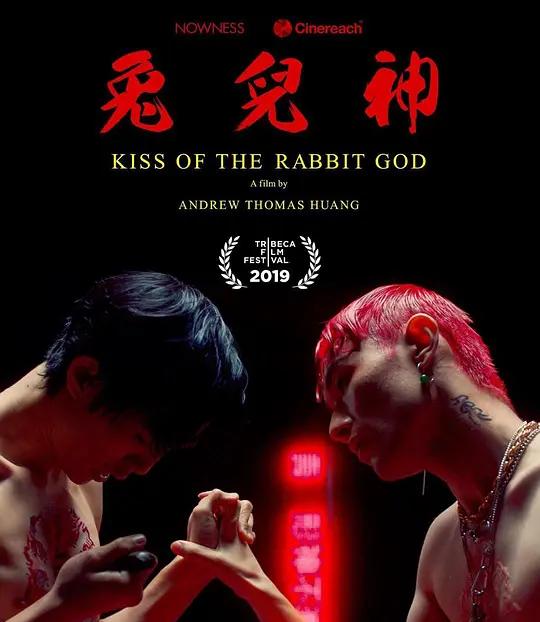
In the work of experimental artist and film director Andrew Thomas Huang, the flesh is a striking element. From video, animation to virtual reality, his work is full of eerie subjects, reminiscent of mysterious ancient myths, or modern BDSM (Leather Rope Pleasure) latex clothing, as if inviting the audience to feel the intimate touch of this non-human skin. And his work "Rabbit God" tells us a romantic affair full of mysterious lust through the lens.
In the film, Matt (Teddy Lee), a Chinese-American restaurant waiter, meets the mischievous god of folklore, the "Rabbit God" (Chen Jianfeng), and is seduced by the latter. Although not everyone knows the rabbit god, in the two gorges of the coast, many people regard the rabbit god as a symbol of homosexuality. (In 2006, New Taipei City built a temple dedicated to the rabbit god, making it a popular pilgrimage destination for gays and lesbians.) )
Andrew learned the story of the rabbit god during a trip. "On a trip to Mexico City, I came across an exhibition themed around Xōchipilli. Hughie Piri was the flower god and gay patron saint of the Aztecs, and his story inspired me to focus the lens again on my own Chinese cultural roots, and therefore wanted to learn about the story of the rabbit god of the Qing Dynasty. ”
He said. The story was written by the Chinese poet Yuan Ming in the 18th century, based on Fujian folklore. The story tells of a Fujian warrior who was sentenced to death for falling in love with another man. After his death, the warrior was named the 'Rabbit God' and thus became the patron saint of homosexuality. ”
In the film, restaurant waitress Matt pushes a large pile of food back and forth every day, sweats in the hot kitchen, and spends the day cleaning up leftovers and answering phone calls to place orders. One day, a mystery shopper with red hair and a seal tattoo aroused Matt's curiosity and interest. He didn't know where the stranger was from, and the two chatted at the faint hint of a shrine in the restaurant.
Matt stuttered as mystery customers introduced themselves, "My name is Shen." However, as soon as he turned around, he disappeared. It wasn't until late at night when Matt was closing the store alone that he reappeared. The meeting is interrupted by Matt's hesitation, and Shen reappears the night after leaving, his vague form foreshadowing his divine identity from ordinary people. An accidental scratch transforms into a blood sacrifice ritual, and a thick red liquid flows into an amulet inscribed with the word "囍" representing happiness and reunion.
There are many images of Chinese Americans living and working in Rabbit God, which can be understood as what media scholar Laura Marks calls "cross-cultural films", a genre or movement that takes material from another culture to challenge a single mainstream cultural background. Cross-cultural cinema can "evoke collective memories of individuals or the masses through non-visual knowledge, sensory experiences in the subconscious of the body, such as touch, smell, and taste." In Rabbit God, Andrew carefully arranges these usually hidden bodies, places, and labors into an audiovisual feast that advances layer by layer, reaching an erotic climax step by step.
Like a divine interpretation of sex, Matt and Shen spiritually complete their union. "Does it hurt?" Matt held the knife in his hand and asked nervously. "There's nothing to be afraid of." Shen answered. Eventually, Matt succumbed to Shen and used the knife in his hand to carve the word "Xian" on his chest. In Andrew's confession, the gods do not need to be incarnated, because the flesh itself is sanctified.
Andrew's work has always been full of sensory stimulation and surreal style, but in Bunny God, he uses a more traditional narrative to compensate for this, but the film's dark red tone and exploration of the mysterious spiritual world still reveal his original artistic preferences. "I'm a visual director, and that helps me tell the inner story of people. This is a fantasy film, and most of the protagonist's experience is psychological and symbolic. He said. For example, I know I want to use sex scenes to advance the climax of the movie. But from the beginning I chose to express same-sex sex in a more detached, spiritual and symbolic way, rather than a very direct, carnal way. ”
Whether it's esoteric deities, rituals, or film dialogue, in the final analysis, these culturally disruptive sexual imagery is just a means for the film to explore new possibilities in the flesh. "I grew up in a very traditional Christian environment, I couldn't show my sexuality since I was a kid, and I lived in a predominantly white society, and as Chinese, I always felt marginalized," Andrew explains. So, naturally, I hope to shake up these common social norms through my work, so that I can speak up for people like me, so that Chinese queers and other queers of color can coexist and live freely. Through an in-depth exploration of Chinese mythology and symbolism, emphasizing the body, senses, and unspoken desires, Andrew tells an unconventional story that encourages the viewer to take charge of their own destiny by obeying your desires. In the words of the red-haired rabbit god in the film: "You can become the master of your own body." "Whether from the point of view of religion or desire, domination means submission.